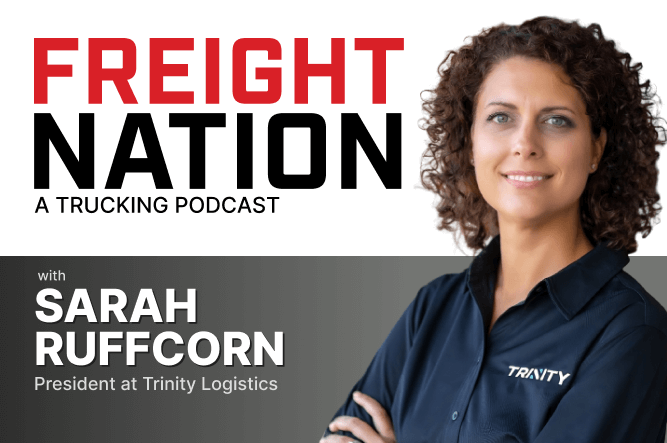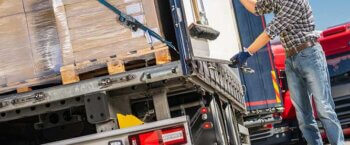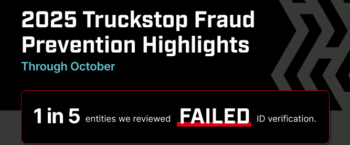Podcast: Leadership Lessons with Sarah Ruffcorn

What are you waiting for?
Find capacity and increase margins starting now.
In the latest episode of Freight Nation, Sarah Ruffcorn, President of Trinity Logistics, shares her inspiring journey into the logistics industry, the valuable lessons she’s learned along the way, and practical advice for professionals in the field. She and host Brent Hutto explore building relationships with carriers, the challenges and benefits of evaluating and implementing technology in the industry, and why leadership is a constant learning process.
Unexpected Beginnings
Sarah didn’t always envision a career in logistics. Originally, she had dreams of working in the fashion industry. Raised in Burlington, Iowa, she eventually attended Western Illinois University, where she majored in Organizational Communications and minored in Marketing and Fashion. Her introduction to logistics came through a marketing professor, Jim Kenney, who connected her with Trinity Logistics.
Sarah began her career at Trinity Logistics in dispatch, a role she found exciting despite being unfamiliar with the industry. She quickly adapted, learning the intricacies of freight transportation and building strong relationships with carriers. Her initial years focused on understanding carrier needs, a foundation that would shape her leadership style and strategic approach in later years.
Doing It For The Team
Sarah believes that good leadership involves self-sacrifice. This is why she has, instead of always moving up the career ladder at Trinity Logistics, often chosen to make lateral career steps—for instance, she has moved from operations to sales to HR. This was done in order to gain experience in the business, rather than always prioritize self-advancement.
There were even opportunities presented to Sarah that she passed up on, simply because she felt there was another candidate better placed to occupy that role:
“There were a couple of opportunities that they presented to me that I did not think that my skill set was the best for the company in that position, and I thought somebody else was better for it. And so there were lots of conversations and I said ‘Have you thought about this person because I think they would actually be way better’.”
Sarah recommends being “super open and honest with yourself” and asking yourself whether you can really help in a particular position, and if you are doing it for the right reasons. It’s these qualities of self-sacrifice that demonstrate a great leader and ultimately change the company for the better.
Building Relationships
One of the most significant lessons Sarah learned was the importance of relationships. In her early years, she developed close ties with carriers, turning professional interactions into friendships. Sarah emphasizes the value of forging strong links with carriers and the owners of those organizations.
As she grew her career, she cites these reciprocal relationships between her team and carriers as a way of solving some of the challenges posed by trucking, since each could help out with certain issues, such as freight not being ready, or logistical problems. The partnerships contributed to a positive environment and meant Sarah enjoyed her work.
“If we had something that just popped up that was burning hot, that needed to move quickly, they would pitch in and move things around to be able to help us out. And it was just such a great partnership with some of those carriers that I just I had a lot of fun coming in every day.”
Leveraging Technology
Sarah’s experience with technology at Trinity Logistics highlights the importance of integrating tech solutions into logistics operations. She played a pivotal role in bridging the gap between software engineers and business processes, ensuring that technological advancements aligned with operational needs.
Sarah believes that, with the number of new technologies being developed, freight professionals will have to continue to evolve how this process works in order to work more efficiently and scale operations. But they will also need to decide quickly what’s helping the business or be able to pivot if a new technology isn’t benefiting their business.
“What we’ve done with several systems here recently is just pilot them in a small group—usually there’s data that’s needed to try to get something started, right? So there’s definitely some work that goes into even just piloting a new product. But we found it to be incredibly beneficial to pilot those for a short amount of time to say, ‘OK, is it really going to work the way we think it is?’ And if so, we can move it towards the next steps, and if it’s not, then we exit stage left.”
Sarah says that Trinity Logistics has so many users in its system that every time it rolls out something en masse that is not the right product, people lose a little trust in it. This is why the smaller pilot group system works so well: restricting a technology rollout to a specific set of stakeholders is a much less extreme approach.
To learn more about Sarah’s journey, tune into this episode of Freight Nation: A Trucking Podcast on Apple, Spotify, or your favorite podcast platform.
Get helpful content delivered to your inbox.
Sign up today.
Find high-quality loads fast, get higher rates on every haul, and access tools that make your job easier at every turn.






